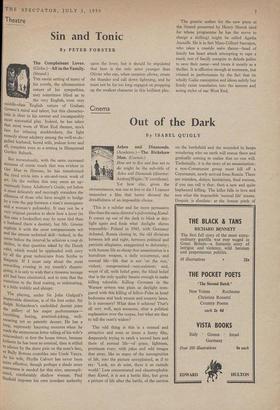Theatre
Sin and Tonic
By PETER FORSTER
The Complaisant Lover. (Globe.)—All in the Family. (Strand.) THE exotic setting of many of his novels, the ultramontane nature of his sympathies, may sometimes blind us to the very English, even very middle-class—English nature of Graham Greene's mind and talent, but this character- istic is clear in his newest and incomparably most successful play. Indeed, he has taken that most worn of West End themes, stock fare for relaxing stockbrokers, the light comedy about adultery among the well-to-do: gulled husband, bored wife, jealous lover and all, complete even to a setting in Hampstead Garden Suburb.
But miraculously, with the same increased sureness of comic touch that was evident in Our Man in Havana, he has transformed the tired trivia into a sin-and-tonic work of art. On the surface this may seem an up- roariously funny Adulterer's Guide, yet below it most delicately and movingly considers the dilemma of those who have sought to bridge by a vow the gap between a man's monogamy and a woman's polyandry. It may not be a very original paradox to show how a lover (in this case a bookseller) may be more tied than a husband (here a dentist), but Mr. Greene exploits it with the most compassionate wit and the utmost technical skill—indeed, in the scene before the interval he achieves a coup de theatre, in that question asked by the Dutch "let, which would be applauded with envy by all the great technicians from Scribe to Raigantt. If I must carp about the most rewarding evening in my month's theatre- going, it is only to wish that a tiresome teenage girl had been eliminated, and to note that the transition to the final mating, or stalemating, is a little wobbly and abrupt.
The playing, under Sir John Gielgud's impeccable direction, is of the first order. Sir Ralph Richardson's cuckolded dentist joins the gallery of his major performances— bumbling, boring, practical-joking, well- meaning yet so patently decent. He has a long, supremely haunting moment when he reads the anonymous letter telling of his wife's misconduct; at first the house titters, because hitherto he has been so comical, then is stilled to silence by the sheer pain on the man's face, as Bully Bottom crumbles into Uncle Vanya. As his wife, Phyllis Calvert has never been more effective, though perhaps a shade more coarseness is needed for this nice, uncompli- cated, comfortably shallow woman. Paul Scofield imposes his own mordant authority
upon the lover, but it should be stipulated that here is the only actor younger than Olivier who can, when occasion allows, create the thunder and call down lightning, and he must not be for too long engaged on propping up the weakest character in this brilliant play. The generic author for the new piece at the Strand presented by Henry Sherek (and for whose programme he has the nerve to charge a shilling) might be called Agatha Anouilh. He is in fact Marc-Gilbert Sauvajon, who takes a comedie noire theme—head of family has heart attack attempting to rape a maid, rest of family conspire to delude police to save their name—and treats it mostly as a thriller. It is effective enough at moments, but vitiated in performance by the fact that its wholly Gallic conception and idiom subtly but firmly resist translation into the accents and acting styles of our West End,






























 Previous page
Previous page